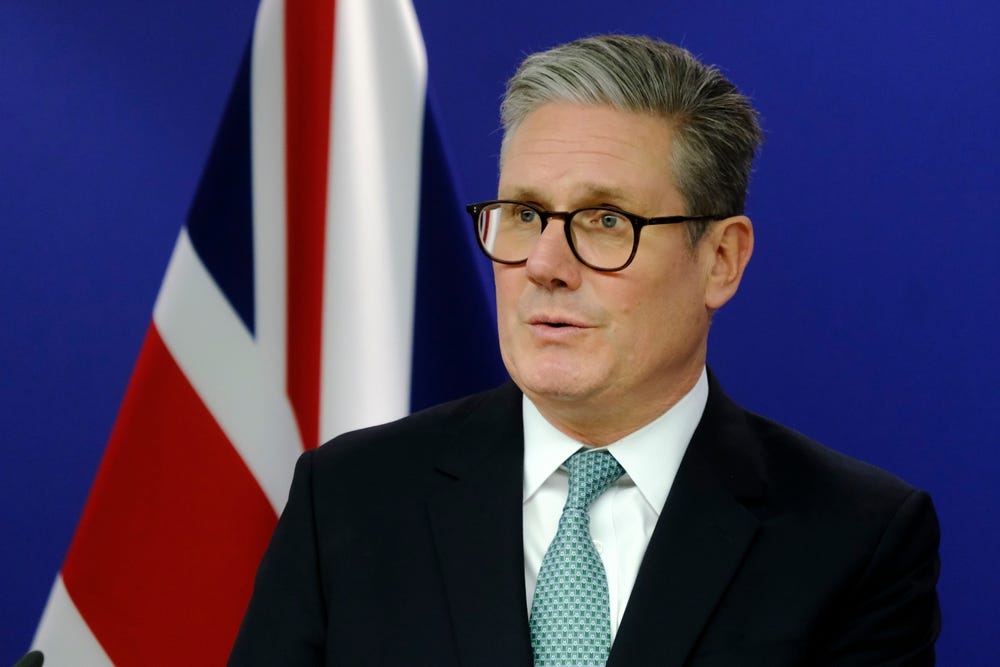Labour must prepare for the coming populist backlash
In order to challenge populism, progressives must stop posing as the protector of special interests

From Donald Trump to Calin Georgescu’s first round presidential victory in Romania a populist backlash is underway across the free world.
Conventional political analysts want to fit such developments into the traditional conservative right versus progressive left competition. Here mould-breakers such as Nigel Farage and George Galloway, both of whom have enjoyed some electoral success, argue that Labour and the Conservatives are two faces of the same coin, who have embraced the same values of mixed economies and social liberalism since the second world war.
The challenge now is how politicians and voters who identify with the old mainstream should respond. Do those on the right of centre morph into nativist populists, as Republicans in the US appear to have done? Should left-of-centre progressives continue to fight the good fight, as they see it, even though adopting the full package of “woke” values, especially on minority rights, risks eroding their base of voter support?
The populist agenda venerates the first half of the motto “charity begins at home”, omitting “but should not stay there”. Government should be for the people of the nation, preferably “natural born” ones. Immigrants are not welcome. The nation should shun entanglements such as the UN, EU or NATO, and stay out of foreign wars – especially Ukraine. Experts and the university educated make up an “elite” which ignores the interests and instincts of ordinary people and which routinely defies “common sense.” Climate change is either a hoax or something that will not be mitigated by sticking to hydrocarbons. Big business is not an ally, yet, paradoxically, many populist leaders are plutocrats themselves, championing deregulation and low taxes.
Progressives reject many of these arguments reflexively. Yet on many issues they need to reconsider if they are to remain viable electoral forces. Automatically championing the minority underdog in preference to one’s own community is unlikely to be either a panacea in practical terms - or an election winner.
Kamala Harris did not campaign on “woke” issues or on being a woman of Indian and Jamaican heritage. Yet the Trump campaign had little trouble associating her with minority causes such as Black Lives Matter, Latinx, critical race theory, pronoun shopping and defunding the police, all of which have been drivers in Democratic activist circles in recent years.
In the general election campaign Sir Keir Starmer steered towards “common sense” by belatedly agreeing that a woman cannot have a penis. In doing so, Labour reaped electoral dividends and resisted the bullying of a “woke” minority.
On many other issues the Labour leader remains wedded to the shibboleths that might be expected of a North London human rights lawyer turned MP. He is attracted to positions because they are right and involve sacrifice. He seldom bothers to make the case for them on merit.
When he does, the Prime Minister is learning that hard pressed “working people” are never going to cheer paying “reparations” for alleged historic transgressions over slavery or industrial pollution. Framing the case in that way even alienates sympathy for giving aid to mitigate clear and present dangers and global inequalities.
Bang on cue “woke” celebrities are marring the fortieth anniversary of Band Aid by attacking the values and lyrical simplifications which inspired it. Self-righteousness will not replace the many millions of pounds spent to help the otherwise helpless.
The new government has maintained cross party agreement that the UK should give full support for Ukraine against Russia, short of direct military involvement. This is presented as charitable rather than being in the national interest for fear of conflict across Europe. The UK’s overall defence spending is continuing to necessitate real terms cuts. This conflicted posture creates space for populist Putin apologists to pose as peaceniks, echoing Neville Chamberlain that this conflict is “in a faraway country, between people of whom we know nothing.”
There is similar incoherence over immigration with ministers disinclined to go into the demographic dilemmas and global nature of mass migration. “Stop the boats” has been replaced with “Smash the gangs”, which sounds just as aggressive. By competing in populist language, progressives polarise attitudes; they enable their opponents to go further while failing to inspire their own sympathisers.
Agonising over trans dogma distracts from things which matter to far greater numbers of the world’s population. Gay rights may be established in most Western democracies but the battle for women’s rights has not yet been won around the world. Trump’s vow to be “a protector… whether women like it or not” betrays a patriarchal attitude towards women’s rights, which in the US has already led to the removal of the federal right to abortion. This development is inspired by evangelical religious attitudes, with some adherents convinced that a woman’s place is in the home, subject to her husband’s authority. Their beliefs also support capital punishment, and corporal punishment for children, which is legal in seventeen US states.
Few conservative politicians in this country are adopting all these traditionalist positions. Yet it was noticeable that the new leader of the opposition Kemi Badenoch was not the only Conservative Party leadership candidate who questioned what impact parental and childcare provisions were having on “the family”. Unspoken is the suggestion that demands on the taxpayer for carers would be dramatically reduced if women stayed at home.
For law makers, deciding what to do about these vexed questions, proper debate and argument should be required rather than posturing and virtue-signalling. The progressive outcome is not always right, the traditional is not always wrong. Just ask Jaguar cars about their fatuous rebrand, rejecting the companies historic appeal along with the internal combustion engine.
Labour is now undergoing similar agonies after trying for an easy win over “assisted dying”, billed in advance by some as this government’s great progressive social reform. There may be a “free vote” for MPs, but this is still a Labour initiative. Sir Keir Starmer is a long-time supporter and he promised Esther Rantzen he would deliver assisted dying into law. Whatever the outcome the Labour cabinet will remain divided, after some ministers, led by the Health Secretary and the Attorney General, have concluded that the decision is not easy at all, even if public opinion is shallowly in favour, just as it has often been for hanging.
Progressives must stop posing as the protector of special interests, a cut above most people’s concerns, if they want to prevent populists imposing their own version of “common sense”.





